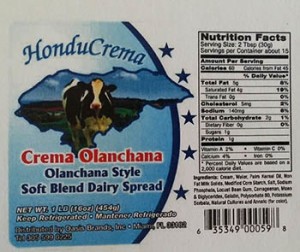A Listeria outbreak linked to soft, Mexican-style cheese has killed one person and sickened two others. Several Lacteos Santa Martha cheeses made by Oasis Brands Inc. with best by dates of 7/14 through 12/31/14 have been recalled. (Click previous link to see full list.)
 Consumers who have purchased any of the recalled cheeses should not eat them as they risk serious or life-threatening injury if they do. Consumers who have purchased the the recalled cheese need to do a thorough cleaning of their refrigerators and kitchens by following these steps recommended by the U.S. Food and Drug Administration (FDA).
Consumers who have purchased any of the recalled cheeses should not eat them as they risk serious or life-threatening injury if they do. Consumers who have purchased the the recalled cheese need to do a thorough cleaning of their refrigerators and kitchens by following these steps recommended by the U.S. Food and Drug Administration (FDA).
Listeria monocytogenes can grow in cold temperatures, so the longer cheese or any other a ready-to-eat food has been stored in the refrigerator, the more potential there is for the bacteria to multiply. Take a photo of the cheese packaging with identifying code numbers if you purchased cheese that is part of the recall. You can use this information and your receipt to get a refund. Then put the recalled food in a plastic bag, seal the bag and throw it away. Wash your hands with warm water and soap for at least 20 after handling food.
Lay a plastic bag out on the countertop. Put foods that occupied the same drawer or area s the cheese on this bag.With a warm soap solution, wash the affected area. Then, with a solution of one tablespoon of chlorine bleach to one gallon of hot water, sanitize it. Then use clean paper towels to dry it. Unopened packages of food should be wiped with the sanitizing solution and dried before returning them to the newly cleaned area.
Discard the bag, any food that may have been cross-contaminated, the soapy solution and bleach solution. Wash your hands with warm, soapy water. Make a fresh soapy solution and fresh sanitizing solution and clean, sanitize and dry the rest of the fridge. Discard the solutions. Wash your hands again. Make a new batch of both solutions and clean, sanitize and dry your cutting boards and countertops. Always wash hands with warm water and soap following the cleaning and sanitization process.
Regular frequent cleaning and sanitizing of your refrigerator, cutting boards and utensils can help to minimize the likelihood of bacterial cross-contamination.




